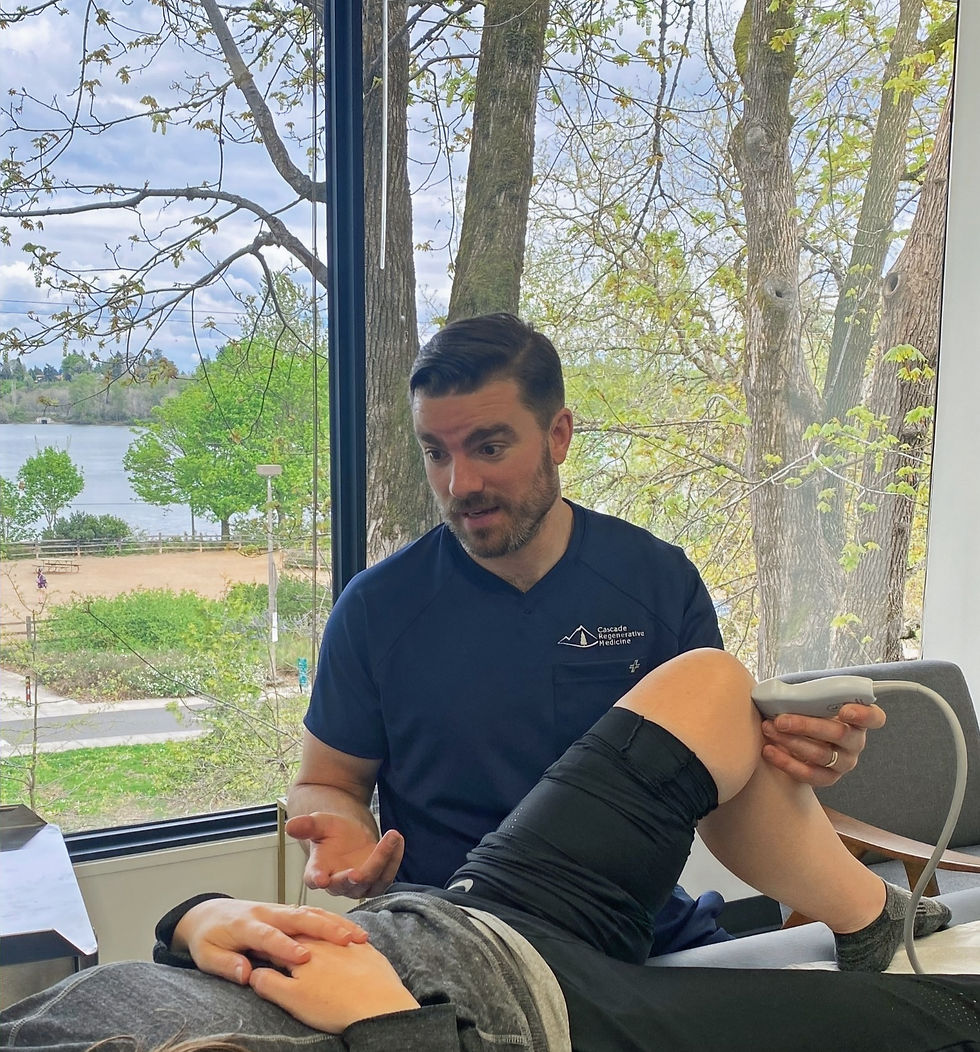The Promise of MFAT: A Long-Lasting, Minimally Invasive Alternative for Knee Osteoarthritis Using Your Own Stem Cells
- Nov 4, 2025
- 3 min read
Samuel G Oltman, ND, RMSK
Knee osteoarthritis (OA) pain is a common challenge, often leaving patients navigating the "orthopedic treatment gap." This space exists between conservative measures, like physical therapy, and the more invasive step of joint replacement surgery. Current standard treatments, such as corticosteroid injections, frequently offer only short-lived symptomatic relief with long term downsides. New evidence continues to mount pointing toward Micro-Fragmented Adipose Tissue (MFAT) injection as a promising, safe, and durable therapeutic option poised to redefine the standard of care for early-stage knee OA.
MFAT leverages the body’s own adipose-derived stem cells, which are able to send healing signals to the surrounding tissue, turning down the inflammatory response and building healthy tissue (cartilage in the case of osteoarthritis) (1). Adipose tissue is easily harvested with a minimally invasive procedure, processed in-house, and injected under ultrasound guidance all within a 2 hour appointment.
Key Conclusions from 2 Recent Clinical Studies on MFAT for Knee OA
The benefits of MFAT is supported by two recent clinical trials that compare its performance against both saline controls and corticosteroid injections:
Durable Benefits: Intra-articular MFAT injection is a safe procedure with durable positive improvements up to a four-year follow-up in patients with early knee OA.
High Success Rate: The treatment demonstrated effectiveness in 68% of patients at the four-year mark.
Functional Improvement: Patients showed significant sustained improvements in pain and functionality scores (WOMAC, Lysholm, and VAS pain scores) from baseline throughout the mid-term evaluation.
Conclusion: These findings suggest MFAT is a viable, minimally invasive stem cell treatment for early knee OA with long-lasting clinical benefits.
Superior Sustained Relief: MFAT demonstrated clinically significant improvement in primary outcomes (joint pain and functionality) over a one-year period compared with a corticosteroid (CS) injections and saline control group.
Transient Corticosteroid Effect: The corticosteroid (CS) group only showed statistically significant improvement compared to the control group in the immediate term (2 and 6 weeks). Crucially, the CS benefits leveled off and were not statistically different from baseline scores by the one-year follow-up.
Conclusion: The sustained efficacy of MFAT, contrasted with the transient effect of corticosteroids, indicates that MFAT may be a superior and viable alternative treatment for patients with OA of the knee who fall into the orthopedic treatment gap.

MFAT: Stem Cells Redefining the Standard of Care for Knee OA
The collective evidence from these trials strongly supports MFAT as a superior option to standard injection therapies. Corticosteroids offer an immediate but fleeting reprieve, whereas MFAT provides a sustained, year-over-year improvement in pain and function.
As a minimally invasive, single-injection therapy with a strong safety profile and demonstrated efficacy lasting up to four years, MFAT stem cells offer patients a meaningful alternative for knee OA. It moves beyond simple pain management to provide durable tissue support, potentially delaying the need for highly invasive and costly joint replacement surgery. If you are navigating the orthopedic treatment gap between physical therapy and joint replacement, contact us to see what MFAT can do for you.
References:
Fan J, Dai J, Lu F, Zhang Y. Editorial: regulation mechanism of adipose-derived stem cells in differentiation and translation. Frontiers in Physiology. 2022;13:852275. doi:10.3389/fphys.2022.852275
Onorato F, Rucci M, Alessio-Mazzola M, et al. Autologous microfragmented adipose tissue treatment of knee osteoarthritis demonstrates effectiveness in 68% of patients at 4-year follow-up. Arch Orthop Trauma Surg. 2024;144(9):3925-3935. doi:10.1007/s00402-023-05143-y
Richter DL, Harrison JL, Faber L, et al. Microfragmented adipose tissue injection reduced pain compared with a saline control among patients with symptomatic osteoarthritis of the knee during 1-year follow-up: a randomized controlled trial. Arthroscopy. 2025;41(2):248-260. doi:10.1016/j.arthro.2024.08.037




Comments